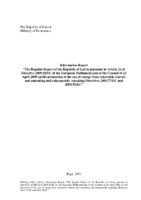| dc.description.abstract | ursuant to Article 22(1) of Directive 2009/28/EC of the European Parliament and of the Council of 23 April 2009 on the promotion of the use of energy from renewable sources and amending and subsequently repealing Directives 2001/77/EC and 2003/30/EC (hereinafter — Directive 2009/28/EC), each Member State shall submit a report to the European Commission (hereinafter — EC) on the progress in the promotion and use of energy from renewable energy sources (hereinafter — RES) by 31 December 2011, and every two years thereafter. During the period until 31 December 2021, Latvia has an obligation to submit six regular reports.In order to promote implementation of a common objective pursuant to Directive 2009/28/EC, the “Republic of Latvia National Renewable Energy Action Plan for implementing Directive 2009/28/EC of the European Parliament and of the Council of 23 April 2009 on the promotion of the use of energy from renewable sources and amending and subsequently repealing Directives 2001/77/EC and 2003/30/EC by 2020” (hereinafter — Action Plan) has been drawn up, and it states indicative tasks for the RE part of each type of final energy consumption (energy consumption in heating and cooling, electricity production, and transport), taking into account the potential of RES available and usable in Latvia. Latvia’s total final energy consumption is secured by local energy resources and the flow of primary resources from Russia, the CIS countries, the Baltic countries, the European Union (hereinafter — EU) and other countries. Currently in the delivery of Latvia’s primary resources three types of energy resources dominate, making up approximately equal proportions: petroleum products (mainly petrol and diesel), natural gas and wood-fuel. Like many other EU countries, Latvia is dependent on imports of primary resources. RES traditionally account for a significant part in the balance of Latvian primary energy resources. Already in 2005, which is assumed as the reference year in Directive 2009/28/EC, the share of renewable energy (hereinafter — RE) in the total gross final energy consumption in Latvia was 32.6%, whereas in EU-27 the average share of RE was only 8.5%.This report has been developed on the basis of the EC’s guidance template1 in order to fulfil the obligation stated in Article 22(1) of Directive 2009/28/EC and to ensure that Latvia’s first regular report on progress in the promotion and use of energy from RES is submitted to the EC within the prescribed time limit. |

